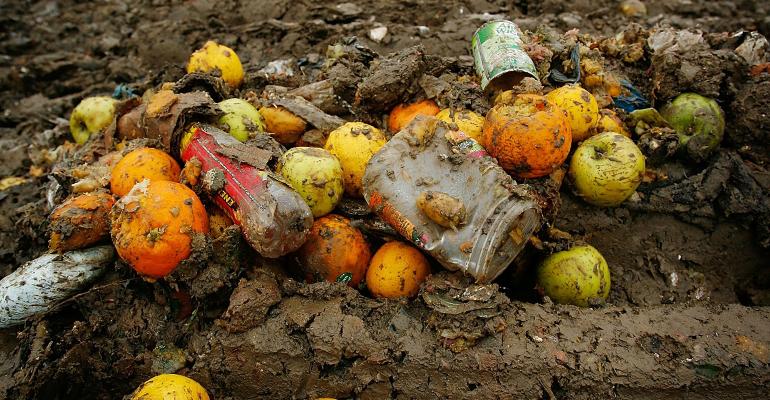 Peter Macdiarmid/staff/Getty Images News
Peter Macdiarmid/staff/Getty Images NewsGuide reveals solutions and best practices to reduce food waste
Food waste represents a big opportunity for retailers
For grocery retailers, food waste represents a $18.2 billion opportunity, according to the first-ever Retail Food Waste Action Guide.
The guide was created in partnership between ReFED, a nonprofit committed to reducing food waste, and the Food Waste Reduction Alliance, a collaboration of the Grocery Manufacturers Association, the Food Marketing Institute and the National Restaurant Association.
“Today’s release of ReFED’s Retail Food Waste Action Guide offers a fresh opportunity for companies already deeply engaged on the issue of food waste, as well as those just starting out, to take a 360-degree view of their operations in search of new approaches and solutions,” said Andrew Harig, senior director of sustainability, tax and trade with the Food Marketing Institute, on behalf of the Food Waste Reduction Alliance, said in a news release. “The Guide is undoubtedly an important new tool in retailers’ efforts to reduce food waste across the entire supply chain.”
The guide includes an overview of the challenges facing retailers and gives industry-specific guidance on prevention, recovery and recycling solutions.
“We’re seeing a major trend of retailers increasing focus on food waste,” said Chris Cochran, executive director of ReFED in the news release. “What was once seen as a built-in cost of doing business is now viewed as a controllable expense and source of value. ReFED is partnering with retailers to put these waste solutions into action.”
The guide was developed with input from various retailers, including Ahold Delhaize USA, Albertsons Cos., Kroger, Publix, Safeway, Target, Wegmans, Walmart and Whole Foods.
And retailers were pleased with the guide’s release.
"Reducing food waste has become a key strategy for businesses to reduce cost while helping people become food secure,” said Kathleen McLaughlin, chief sustainability officer for Walmart and president of the Walmart Foundation.
Said Darcie Renn, the senior sustainability manager at Albertsons Cos.: “Grocery retailers have a great opportunity to lead the way in curbing food waste through the implementation of best practices.”
Some key finding from the guide included:
• On average, the value of wasted food in retail is equal to roughly double the profits from food sales;
• Prevention solutions such as dynamic pricing and markdowns have the highest profit potential;
• Retailers can increase food donations to provide nearly 1.2 billion more meals;
• New digital technologies such as ride-sharing platforms and chain-of-custody records are being applied to food waste through solutions like Dynamic Routing and Cold Chain Management; and
• Low-cost solutions, such as standardized date labeling, already exist and are easy to implement.
• Prevention solutions such as dynamic pricing and markdowns have the highest profit potential;
• Retailers can increase food donations to provide nearly 1.2 billion more meals;
• New digital technologies such as ride-sharing platforms and chain-of-custody records are being applied to food waste through solutions like Dynamic Routing and Cold Chain Management; and
• Low-cost solutions, such as standardized date labeling, already exist and are easy to implement.
“The Grocery Manufacturers Association (GMA) is committed to reducing food waste and eliminating hunger across the country,” said Meghan Stasz, GMA senior director of sustainability, in the news release.
“The Food Waste Reduction Alliance was formed to encourage the sharing of best practices within and across industry segments. We’re pleased to partner with ReFED in offering these new guides, which provide actionable advice for operators at all levels of the food waste reduction journey.”
No comments:
Post a Comment